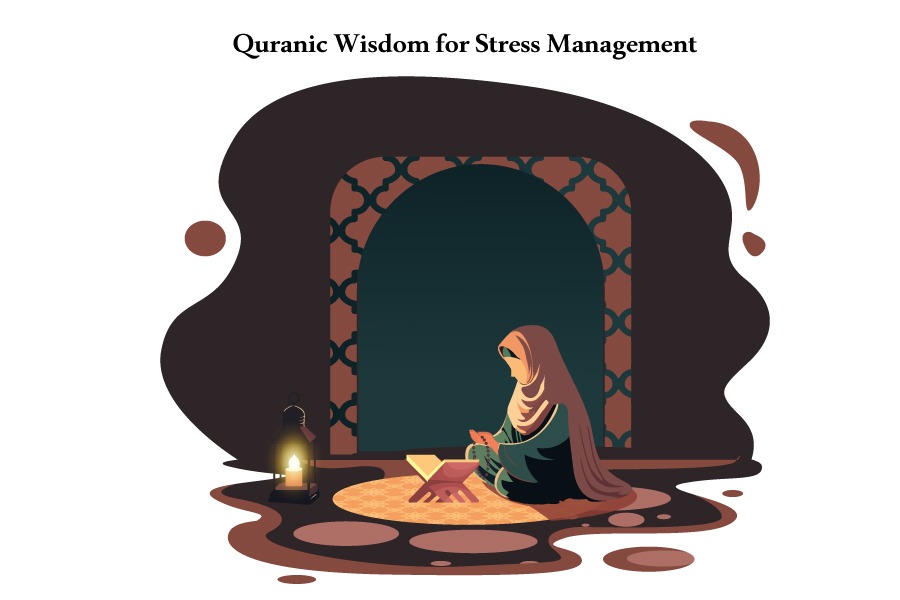In the reality of human existence, it is common for people to desire what they currently lack. The poor long for wealth, the wealthy worry about losing it, the single yearn for marriage, and the married may desire children. Such desires and concerns are inherent to life, leading to anxieties and grief.
The question arises: How can we overcome these anxieties and grief? How can we become less consumed by these realities, preventing them from overwhelming us?
Recognizing the impermanence of worldly desires is crucial. Understanding that life is filled with ups and downs, and material possessions or circumstances do not guarantee lasting happiness. Embracing contentment with what we have and expressing gratitude for our blessings can cultivate inner peace and reduce anxieties.
Quranic Perspective on Stress Management
Indeed, one of the fundamental principles in Islam that help in stress management is the belief in “al-Qadr” or Divine Decree. It means recognizing that Allah is in absolute control of our lives, and everything that happens to us is by His will and plan. This belief is a source of comfort and solace during difficult times.
In Islam, it is emphasized that nothing occurs in this world without the knowledge and permission of Allah. Even the tiniest events, like a leaf falling from a tree, are under His control. When we truly internalize this belief, it can act as a powerful antidote against grief and anxiety.
فَسَتَذْكُرُونَ مَآ أَقُولُ لَكُمْ ۚ وَأُفَوِّضُ أَمْرِىٓ إِلَى ٱللَّهِ ۚ إِنَّ ٱللَّهَ بَصِيرٌۢ بِٱلْعِبَادِ
And you will remember what I [now] say to you, and I entrust my affair to Allāh. Indeed, Allāh is Seeing of [His] servants.”
(AlQuran 40:44)
During moments of worry or overwhelming anxiety, remembering that Allah is in control and we are not, can be immensely reassuring. It shifts the burden of responsibility from ourselves to the All-Knowing and All-Wise Creator.
In Surah Baqarah, Allah states that
رَبَّنَا وَلَا تُحَمِّلْنَا مَا لَا طَاقَةَ لَنَا بِهِۦ
Our Lord, and burden us not with that which we have no ability to bear.
(AlQuran 2:286)
Trusting in His plan and wisdom helps in stress management and find inner peace. Islam encourages believers to take action, make choices, and work diligently while placing their trust in Allah’s will. Striking a balance between reliance on Allah and taking proactive steps is essential for a healthy approach to life’s challenges.
مَن كَانَ يُؤْمِنُ بِٱللَّهِ وَٱلْيَوْمِ ٱلْءَاخِرِ ۚ وَمَن يَتَّقِ ٱللَّهَ يَجْعَل لَّهُۥ مَخْرَجًا
That is instructed to whoever should believe in Allāh and the Last day. And whoever fears Allāh – He will make for him a way out
وَيَرْزُقْهُ مِنْ حَيْثُ لَا يَحْتَسِبُ ۚ وَمَن يَتَوَكَّلْ عَلَى ٱللَّهِ فَهُوَ حَسْبُهُۥٓ ۚ إِنَّ ٱللَّهَ بَٰلِغُ أَمْرِهِۦ ۚ قَدْ جَعَلَ ٱللَّهُ لِكُلِّ شَىْءٍ قَدْرًا
And will provide for him from where he does not expect. And whoever relies upon Allāh – then He is sufficient for him. Indeed, Allāh will accomplish His purpose. Allāh has already set for everything a [decreed] extent.
(AlQuran 65:2-3)
The story of Prophet Muhammad (peace be upon him) and Abu Bakr (may Allah be pleased with him) in the cave of Al-Thur during the Hijrah is a powerful example of seeking solace in Allah during times of stress and worry.
When the polytheists were pursuing them, and Abu Bakr was feeling anxious and afraid, the Prophet Muhammad (peace be upon him) provided a profound reassurance, saying, “Don’t worry, Allah is with us.”
إِلَّا تَنصُرُوهُ فَقَدْ نَصَرَهُ ٱللَّهُ إِذْ أَخْرَجَهُ ٱلَّذِينَ كَفَرُوا۟ ثَانِىَ ٱثْنَيْنِ إِذْ هُمَا فِى ٱلْغَارِ إِذْ يَقُولُ لِصَٰحِبِهِۦ لَا تَحْزَنْ إِنَّ ٱللَّهَ مَعَنَا ۖ فَأَنزَلَ ٱللَّهُ سَكِينَتَهُۥ عَلَيْهِ وَأَيَّدَهُۥ بِجُنُودٍ لَّمْ تَرَوْهَا وَجَعَلَ كَلِمَةَ ٱلَّذِينَ كَفَرُوا۟ ٱلسُّفْلَىٰ ۗ وَكَلِمَةُ ٱللَّهِ هِىَ ٱلْعُلْيَا ۗ وَٱللَّهُ عَزِيزٌ حَكِيمٌ
If you do not aid him [i.e., the Prophet] – Allāh has already aided him when those who disbelieved had driven him out [of Makkah] as one of two, when they were in the cave and he [i.e., Muhammad] said to his companion, “Do not grieve; indeed Allāh is with us.” And Allāh sent down his tranquillity upon him and supported him with soldiers [i.e., angels] you did not see and made the word of those who disbelieved the lowest, while the word of Allāh – that is the highest. And Allāh is Exalted in Might and Wise.
(AlQuran 9:40)
This simple yet profound statement reflects the essence of finding comfort and relief in turning to Almighty Allah during challenging moments. Trusting in Allah’s presence, support, and protection can be the most potent antidote to stress and worries.
Stress Management Techniques in the Light of the Quran
Stress Management Techniques in the light of the Quran involve seeking guidance from the teachings of Islam to find comfort, strength, and peace amidst life’s challenges. Here are some techniques for stress management based on Quranic principles:
-
Turn to Allah in Prayer- The Coolness of Eyes
Establishing a regular prayer routine is highly significant in Islam and serves as a means to find peace, comfort, and helps in stress management. The Quran emphasizes the importance of prayer and its impact on establishing a connection with Allah. Surah Taha says,
فَٱصْبِرْ إِنَّ وَعْدَ ٱللَّهِ حَقٌّ ۖ وَلَا يَسْتَخِفَّنَّكَ ٱلَّذِينَ لَا يُوقِنُونَ
“So be patient. Indeed, the promise of Allah is truth. And let them not disquiet you who are not certain [in faith].”
(AlQuran 30:60)
The act of performing prayers involves physical movements, recitation of verses, and supplication. This combination of actions creates a sense of mindfulness and focus on the divine, leading to a state of calmness and serenity. As believers stand in front of Allah in prayer, they unload their worries, seeking guidance, forgiveness, and relief.
Moreover, Surah Al-Baqarah mentions the connection between prayer and finding peace:
وَٱسْتَعِينُوا۟ بِٱلصَّبْرِ وَٱلصَّلَوٰةِ ۚ وَإِنَّهَا لَكَبِيرَةٌ إِلَّا عَلَى ٱلْخَٰشِعِينَ
“And seek help through patience and prayer, and indeed, it is difficult except for the humbly submissive [to Allah].”
(AlQuran 2:45)
Prayer becomes a source of strength for those who humbly submit to Allah, as it offers a moment of reflection and reliance on the Creator during stressful times.
-
Practice Patience and Perseverance:
Practicing patience and perseverance is an essential aspect of Islamic teachings, and it plays a significant role in stress management and dealing with life’s difficulties. The Quran and the sayings of Prophet Muhammad (peace be upon him) emphasize the virtue of patience as a means of attaining Allah’s rewards and blessings.
Patience in Arabic is known as “Sabr,” and it is mentioned throughout the Quran in various contexts. Surah Al-Baqarah highlights the reward for those who practice patience during adversity:
وَلَنَبْلُوَنَّكُم بِشَىْءٍ مِّنَ ٱلْخَوْفِ وَٱلْجُوعِ وَنَقْصٍ مِّنَ ٱلْأَمْوَٰلِ وَٱلْأَنفُسِ وَٱلثَّمَرَٰتِ ۗ وَبَشِّرِ ٱلصَّٰبِرِينَ
“And We will surely test you with something of fear and hunger and a loss of wealth and lives and fruits, but give good tidings to the patient,
ٱلَّذِينَ إِذَآ أَصَٰبَتْهُم مُّصِيبَةٌ قَالُوٓا۟ إِنَّا لِلَّهِ وَإِنَّآ إِلَيْهِ رَٰجِعُونَ
Who, when disaster strikes them, say, ‘Indeed we belong to Allah, and indeed to Him we will return.’
أُو۟لَٰٓئِكَ عَلَيْهِمْ صَلَوَٰتٌ مِّن رَّبِّهِمْ وَرَحْمَةٌ ۖ وَأُو۟لَٰٓئِكَ هُمُ ٱلْمُهْتَدُونَ
Those are the ones upon whom are blessings from their Lord and mercy. And it is those who are the [rightly] guided.”
(AlQuran 2:155-157)
This verse illustrates that when faced with challenges and stress, believers are encouraged to adopt an attitude of patience and reliance on Allah. Through patience, they find strength, hope, and the understanding that their ultimate return is to Allah.
By practicing patience, believers demonstrate their trust in Allah’s wisdom and plan. It involves enduring with steadfastness and resilience during times of stress and hardships, knowing that Allah’s rewards await those who remain patient.
Perseverance, or “Istiqaamah,” is also encouraged in Islam. It means to remain steadfast and consistent in one’s faith, actions, and adherence to the path of righteousness. Surah Ghafir states:
فَٱصْبِرْ إِنَّ وَعْدَ ٱللَّهِ حَقٌّ ۚ فَإِمَّا نُرِيَنَّكَ بَعْضَ ٱلَّذِى نَعِدُهُمْ أَوْ نَتَوَفَّيَنَّكَ فَإِلَيْنَا يُرْجَعُونَ
“So be patient. Indeed, the promise of Allah is truth. And whether We show you some of what We have promised them, [O Muhammad], or We take you in death, to Us is their return;
(AlQuran 40:78)
-
Seeking Refuge in Allah:
Seeking refuge in Allah is an important concept in Islam and serves as a means of protection and seeking comfort in times of distress, fear, or stress. Muslims are encouraged to seek refuge in Allah from various sources of harm, evil, and anxiety.
The act of seeking refuge is known as “Istiaadhah” in Arabic. It involves reciting specific supplications or verses from the Quran to seek Allah’s protection and assistance. Two short chapters of the Quran, Surah Al-Falaq (Chapter 113) and Surah An-Nas (Chapter 114) are commonly recited for seeking refuge in Allah.
Surah Al-Falaq (113) starts with the words, “Say, ‘I seek refuge in the Lord of daybreak'” and continues to seek refuge from the evil of various creatures of the night. Surah An-Nas (114) starts with, “Say, ‘I seek refuge in the Lord of mankind,'” and seeks protection from the whispers of the evil whispers of those who hide and try to cause harm.
By seeking refuge in Allah, believers express their vulnerability and reliance on the Creator. This act of humility and trust in Allah’s protection can provide a sense of reassurance and relief from the stresses and anxieties of life. It serves as a reminder that Allah is the ultimate source of strength and support, and seeking His refuge brings a sense of peace and security.
-
Recite and Reflect on Quranic Verses:
Reciting and reflecting on Quranic verses is a powerful practice that aids in stress management for Muslims. When believers engage with the Quran, reciting its verses with sincerity and contemplation, it allows them to connect with Allah and find inner peace. One of the key aspects of stress management is seeking refuge in Allah and finding comfort in His words. Surah Ar-Ra’d says,
ٱلَّذِينَ ءَامَنُوا۟ وَتَطْمَئِنُّ قُلُوبُهُم بِذِكْرِ ٱللَّهِ ۗ أَلَا بِذِكْرِ ٱللَّهِ تَطْمَئِنُّ ٱلْقُلُوبُ
“Those who have believed and whose hearts are assured by the remembrance of Allah. Unquestionably, by the remembrance of Allah, hearts are assured.”
(AlQuran 13:28)
Reciting the Quran brings a sense of tranquility to the heart, especially when facing challenges and anxieties. Surah Ash-Sharh reassures believers,
فَإِنَّ مَعَ ٱلْعُسْرِ يُسْرًا
“For indeed, with hardship [will be] ease.
إِنَّ مَعَ ٱلْعُسْرِ يُسْرًا
Indeed, with hardship [will be] ease.”
(AlQuran 94:5-6)
This reminder of Allah’s promise of ease after hardship offers comfort and hope, reducing stress and worries.
Moreover, reflecting on the meanings of Quranic verses provides practical guidance in stress management. Surah Al-Baqarah reminds us,
رَبَّنَا وَلَا تُحَمِّلْنَا مَا لَا طَاقَةَ لَنَا بِهِ
“Allah does not burden a soul beyond that it can bear…”
(AlQuran 2:286)
This verse teaches believers to trust in Allah’s wisdom, knowing that He will not burden them with more than they can handle. Understanding this can alleviate stress by relieving the fear of overwhelming challenges.
By reciting and reflecting on Quranic verses, Muslims gain spiritual insight, increased resilience, and a deeper connection with Allah.
-
Dua (Supplication):
Dua (supplication) is a powerful tool for stress management in Islam. By turning to Allah in heartfelt prayer, believers seek comfort, guidance, and relief from life’s challenges. The Quran encourages the act of dua and emphasizes its effectiveness in alleviating stress and finding solace.
Surah Ghafir (40:60) states,
“And your Lord says,
وَقَالَ رَبُّكُمُ ٱدْعُونِىٓ أَسْتَجِبْ لَكُمْ ۚ إِنَّ ٱلَّذِينَ يَسْتَكْبِرُونَ عَنْ عِبَادَتِى سَيَدْخُلُونَ جَهَنَّمَ دَاخِرِينَ
And your Lord says, “Call upon Me; I will respond to you.” Indeed, those who disdain My worship will enter Hell [rendered] contemptible.
(AlQuran 40:60)
This verse highlights Allah’s promise to respond to those who call upon Him in prayer. By engaging in dua, individuals acknowledge their dependence on Allah and seek His help, leading to a sense of peace and relief from stress.
-
Maintain Ties of Kinship for Stress Management:
Maintaining ties of kinship, or upholding family bonds, is crucial in Islam and plays a significant role in stress management. The Quran and the teachings of Prophet Muhammad (peace be upon him) emphasize the importance of treating family members with kindness, compassion, and respect. By nurturing strong family connections, individuals can find support, love, and understanding, which can be instrumental in stress management and anxieties.
In Surah An-Nisa, Allah says,
يَٰٓأَيُّهَا ٱلنَّاسُ ٱتَّقُوا۟ رَبَّكُمُ ٱلَّذِى خَلَقَكُم مِّن نَّفْسٍ وَٰحِدَةٍ وَخَلَقَ مِنْهَا زَوْجَهَا وَبَثَّ مِنْهُمَا رِجَالًا كَثِيرًا وَنِسَآءً ۚ وَٱتَّقُوا۟ ٱللَّهَ ٱلَّذِى تَسَآءَلُونَ بِهِۦ وَٱلْأَرْحَامَ ۚ إِنَّ ٱللَّهَ كَانَ عَلَيْكُمْ رَقِيبًا
“O mankind, fear your Lord, who created you from one soul and created from it its mate and dispersed from both of them many men and women. And fear Allah, through whom you ask one another, and the wombs. Indeed, Allah is ever, over you, an Observer.”
(AlQuran 4:1)
In the above verse, it is highlighted that The common origin of humanity is from a single soul and emphasizes the importance of recognizing and cherishing family relationships as a divine bond.
By staying connected with family members, individuals have a support system to lean on during difficult times, reducing feelings of isolation and stress. Acts of kindness, forgiveness, and compassion within the family can foster a positive and harmonious environment, leading to emotional well-being and a sense of belonging. Strong family bonds offer a sense of security and stability, providing a buffer against stress and hardships, as family members can share burdens, offer advice, and provide comfort in times of need.
How we can help you with Stress Management?
AlQuranClasses is here to assist you in managing stress through teachings and guidance based on Quranic principles. Our personalized advice encompasses incorporating regular prayers, recitation, and memorization of Quranic verses, as well as seeking refuge in Allah. We strive to share inspirational quotes and reminders from the Quran, offering comfort during challenging times. Our primary objective is to support individuals in finding ease and peace through the teachings of the Quran while encouraging them to strengthen their faith and connection with Allah. Don’t hesitate; enroll now and discover the techniques our online Quran classes can bring for stress management. Take this step towards a calmer, more tranquil life.
Conclusion
In conclusion, stress is a common aspect of human existence, and seeking solace and guidance from the Quran can be a powerful tool in managing stress effectively. The Quran emphasizes the importance of turning to Allah, practicing patience, maintaining ties of kinship, and finding comfort in His words. Reciting and reflecting on Quranic verses can provide spiritual nourishment and inner peace. Furthermore, seeking refuge in Allah and incorporating regular prayers can offer a sense of protection and support during challenging times. By following the teachings of the Quran, individuals can find strength, resilience, and relief from stress, ultimately fostering a deeper connection with Allah and a more balanced approach to life’s difficulties.
FAQs:
- How can the Quran help in stress management?
The Quran offers guidance and teachings that promote patience, seeking refuge in Allah, and maintaining ties of kinship. Reciting and reflecting on Quranic verses can provide comfort and peace during stressful times.
- Can reciting Quranic verses bring relief from stress?
Yes, reciting and reflecting on Quranic verses can provide comfort and relief during stressful times. The soothing and profound words of the Quran have a calming effect on the heart and mind.
- How does seeking refuge in prayer help manage stress?
Engaging in regular prayer helps individuals connect with Allah, find solace, and seek guidance. It provides a sense of support and comfort, reducing feelings of stress and anxiety.
- Are there specific times for seeking community support in Islam?
Muslims are encouraged to seek support from their community and turn to religious scholars or counselors whenever needed. There are no specific times; rather, support should be sought whenever one faces challenges.
- Is it essential to memorize Quranic verses for stress management?
While memorizing Quranic verses is beneficial, it is not a requirement for stress management. Reading, reflecting, and understanding the meanings of the verses can also provide comfort and relief.

















